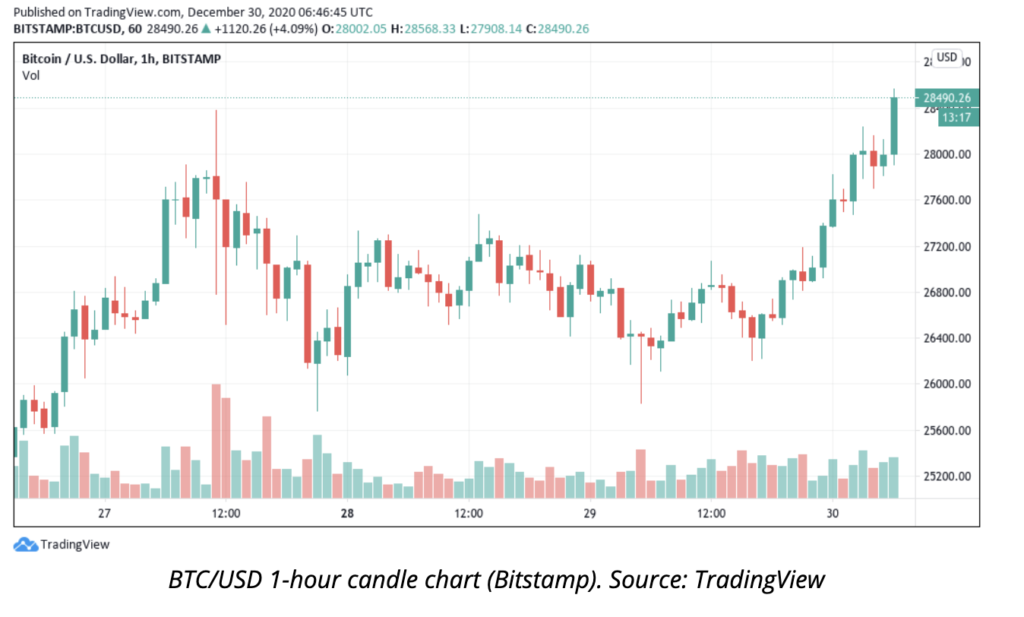
Happy new year from Bitesize! First came the recap, then comes the predictions for the year ahead. Sit back for a second and imagine a post-covid world, what does that look like to you? Imagine what it’ll be like to travel across the world again, to get your business back on track and get back to normalcy. But what does normalcy even look like, and how fast can things really return to normal?
The rise and adoption of the Covid-19 economy
We think the covid-19 economy is here to stay, in some shape or form. Once consumers adapt to new digital or remote models, expect some of them to change permanently. Remote working and virtual meetings on the likes of Zoom, Slack, Microsoft Teams and other platforms saw skyrocketed growth this past year, and we think for businesses that makes sense, this trend will stay.
Other platforms are tackling remote working, such as tandem, which acts as a virtual office for remote teams. Expect to see more variations of this.
Tech workers are shifting to permanent remote work, which isn’t the solution for everyone. Companies also need to re-think productivity, Zoom fatigue, housing situations and more. Twitter, for example, is shifting to permanent remote working policy.
There are implications of this. Salaries for workers in San Francisco and other large cities may fall due to the introduction of job seekers that weren’t previously considered.
This is a very western world centric trend, we think. In Thailand, the common concensus is that the majority of the corporate workforce work in an office building. However, corporates such as Siam Commercial Bank and Osotsapa are becoming more flexible and permitting some teams to stagger their office hours.
Our take? the pandemic has taught us to be productive in the most unproductive of circumstances. If remote working is able to save significant amounts of costs for companies yet still produce quality work, why not adapt to this new reality?
Beyond virtual offices and working from our kitchen tables, other aspects of the covid-19 economy will remain alive and well. This includes on-demand delivery services and gaming, with gaming spend jumping by 40% and accelerating the market to US$170 billion.
The key takeaway? We’re staying online.
Thailand’s political landscape will remain divisive
Thailand’s political landscape and conflict goes hand in hand. 2020 was a breakthrough year of political discussions and actions, where protestors came out to address the reform of Monarchy and other social taboos. Meanwhile, Prime Minister Prayuth Chan-o-cha continues to underwhelm the country.
Although protests have seemingly been temporarily suspended, the undercurrent is very much still there.
2021 will see a continued dissatisfaction in the government, the cabinet and ministers, and eyes will be on the delayed re-drafting of the constitution where the issue of 250 senators should be removed all together. If our leaders remain indifferent to public outcry, we can expect more pushback from the people.
Travel & Vaccinations
in the near future, we can imagine that your proof of covid-19 vaccination will act like a visa stamp. Airlines such as Quantas has already issued a statement saying that all international flights will require passengers to show proof of vaccinations before boarding. A vaccine passport, they’re calling it.
IBM has also created its Digital Health Pass, which is designed to provide organizations with a way to bring people back into workplaces, schools, stadiums and flights.
According to IBM, “the solution is designed to enable organizations to verify health credentials for employees, customers and visitors entering their site based on criteria specified by the organization.”
Air travel will most likely begin to resume by Q2 2021.
Vaccinations are nowhere near mass distribution, or distribution at all in some cases (AstraZeneca).It will take some time until the majority of each country’s population has been vaccinated.
We expect a growing trend of shorter routes, curated travels and road trips for the time being. For Thais, domestic vacations will probably still be popular into the new year, especially before international flights operate as normal. However, this is contingent on whether we can manage our surging local covid-19 cases.
Generally though, pre-covid levels of travel will most likely not resume until mid 2021 or later.
Airbnb, the US based company that went public amid a global pandemic may also be well positioned to capture these trends in 2021. The rise of freelancers and remote workers will drive a surge in what we used to call co-working, and according to NYU professor Scott Galloway, Airbnb is best positioned to get in front of these trends.
Diversity will be mandatory
Don’t forget, 2020 was also the year of black lives matter and a continued advocacy for women’s rights and gender equality. In 2021, organizations should commit to taking action to achieve real changes, in the way racial injustice, gender equality and more is addressed.
In Thailand, this means schools and workplaces should finally learn to properly address and manage claims of sexual misconduct, as well.
Prompted by the black lives matter movement, many companies in the US have made it their mission to take action on racial discrimination in the US. However, only time will tell whether it will lead to real change beyond Instagram hashtags.
Environmentally Conscious
Recycling, waste management, combatting global warming and cleantech are all terms we have heard in 2020, and expect to hear (and hopefully see) more as we tread into the new year.
Sustainable waste management systems is needed more than ever, particularly at the height of a global pandemic.
A London based company called ReCircle is developing ways to reclaim raw materials from waste, to go back into manufacturing, for example.
In Thailand, we are still waiting to see decade old buses get swapped for cleaner public vehicles. Our prediction? we won’t see one next year.
In 2021, governments will have to simultaneously manage economic recovery and include global warming reduction plans in their blueprint. Public pressure will most likely pressure both the public and private sector into enacting more sustainable, environmentally friendly policies.
Bitcoin’s continued surge and potential regulation
Bitcoin surpassed its all time high price of US$25,000 and is currently sitting at US$28,000. It’s showing no sign of slowing down.

Some say bitcoin could reach as high as $50,000 next year, and although that seems extreme, it is not out of the question if investors move money from other assets into bitcoin. On the contrary, it could also be that bitcoin will head into the opposite direction. Because the digital currency is not tied to real world phenomenons, it is sometimes difficult to predict which way it will swing.
Regardless, mainstream adoption has been happening this year, and it is unlikely to all disperse by 2021. Another thing to keep watch on then, is the issue of regulations.
The natural assumption is that a Democratic administration will regulate more stringently than a Republican administration, but again, the President elect may be lenient and most likely focus on more pressing issues like the pandemic, vaccine distribution and getting the millions of unemployed back to work.
Accountability & Purpose
People will generally be more hyper-aware, still nervously consuming news from Twitter threads and generally demanding more ethical practices, accountability and flock to brands that are purpose driven.
The age of social media has driven consumers to call out corporates, brands and leaders that they see are not living up to standard. We are seeing heightened versions of this in the west, but as we know, Thais are more vocal on social media more than ever (regardless of whether our leaders hear it or not), and this is a good step forward.
Purpose driven companies inherently understand why they exist and who they are best built to serve, according to consulting firm Deloitte’s report on 2021 market trends.
In Deloitte’s survey of 2,447 global consumers, 79% of respondents recalled instances of brands positively responding to COVID-19 to help their customers, workforces, and communities. Deloitte saw this manifest in countless ways: financial institutions pausing overdraft fees and deferring loan payments; shoe companies donating thousands of pairs of shoes to nurses healing their communities; and many companies shifting their long-standing corporate policies to better support workforces.
We think 2021 will also be the continued rise of social enterprise, companies with a mission that combines profit with societal impact. Millennials and Gen Z in particular, gravitate towards this.
The private sector and businesses are probably best positioned to combat these trends, even more so than government and non-profits. This sentiment is true across the globe.
And lastly
We’re positioned to leap into 2021 with more resources, knowledge and awareness than ever before. Let’s maintain some ounce of optimism and combat challenges with the knowledge that we have already waved goodbye to 2020.
As for Bitesize, we’ll continue to be your daily sources of news bites and more. Thank you for reading & stay tuned for bigger and better things!
Bitesize BKK




